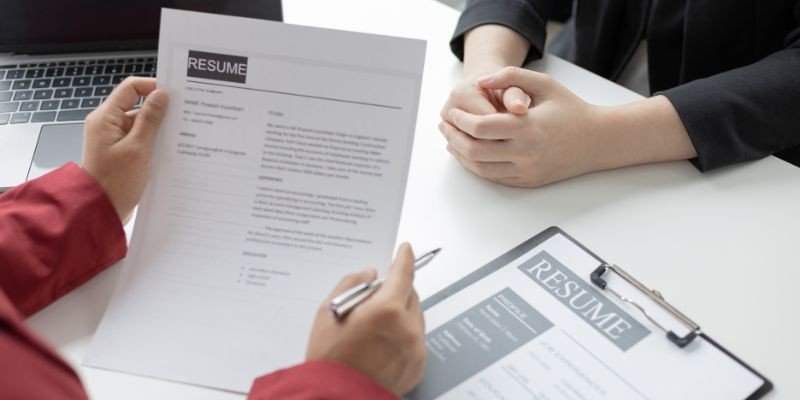Each position requires a unique strategy, including targeted inquiries to assess your suitability. Every business has its own culture. Additionally, every interviewer communicates differently. From observing your body language to skillfully responding to any behavioral interview question, this provides you with a wealth of variables to prepare for how to introduce yourself.
However, you will always have to introduce yourself throughout the interview process. Whether you’re speaking in person or on the phone, your self-introduction sets the tone for the remainder of the exchange.
It’s your opportunity to introduce yourself and highlight the unique qualities that distinguish you from the competition. A powerful, self-assured opening may create a memorable first impression and establish you as a competitive applicant.
When learning how to introduce yourself in an interview, you must strike a balance between professionalism and charisma to highlight your worth and provide a glimpse into what it would be like to work with you. Here are some pointers and tips to introduce yourself to help you take advantage of this chance and leave your imprint.
Tips To Make A Good First Impression In An Interview

1. Mind Your Body Language
How you portray yourself is equally as important as how you say how to introduce yourself since around 70% of communication is nonverbal. Body language, facial expressions, eye contact, gestures, posture, and tone of voice are all important parts of how your message is understood.
Your message sounds authentic and confident when your words and actions match up. But if you smile while talking about something important or use a flat, monotonous voice while you’re excited, you could come off as uninterested, dishonest, or unprepared.
For instance, if you say you’re thrilled about a job during an interview but slouch or don’t make eye contact, it sends contradictory messages that might make you less credible. To prevent this, it helps to practice answering typical interview questions, particularly ones like “Tell me about yourself.”
Working with a professional coach, a buddy, or simply in front of a mirror might help you feel more confident and stop doing things that make you uneasy.
2. Greet Properly
A confident and polite greeting plays a significant part in tips to introduce yourself and make a positive first impression during a job interview. To set a courteous and professional tone, begin with a kind welcome like “Good morning” or “Good afternoon.”
Following your welcome, demonstrate appreciation by saying something like, “Thank you for taking the time to meet with me today.” This shows respect for the interviewer’s schedule and indicates professionalism. Research has found that a strong handshake is typically viewed as a sign of warmth, confidence, and openness—qualities that may help develop a favorable connection right from the outset.
Coupling the handshake with a genuine grin helps you look personable, energetic, and comfortable in your setting. These modest yet important actions indicate that you are prepared and emotionally knowledgeable. Remember, your early minutes in the interview room may considerably affect how the remainder of the discussion develops, so making them count can offer you a crucial edge.
3. Start With Something Unique
Your self-introduction is a good chance to create a lasting impression before the official interview questions begin. It enables you to showcase a distinctive trait, essential professional experience, or remarkable achievement that highlights your skills and appropriateness for the post. Rather than providing your whole résumé, concentrate on one or two relevant experiences that correlate with the position you’re looking for.
For instance, if you’re interviewing for a project management role, you can say, “One of my proudest moments was leading a team to develop a mobile app from concept to launch. The experience taught me the value of clear communication, time management, and collaborative problem-solving.”
This not only demonstrates essential talents but also expresses your enthusiasm and aptitude to operate in a collaborative atmosphere. Sharing a short and captivating tale like this makes it simpler for the interviewer to ask follow-up questions and creates a confident tone for the remainder of the interview.
4. Share Your Educational Background With Your Interviewers
If you are a new graduate, your educational history becomes one of the most crucial components of your self-introduction, particularly if you have minimal professional experience. Focus on giving crucial academic facts, such as your degree, the college or institution you attended, and the school’s name.
For example, you may say, “I recently completed my Bachelor of Technology in Computer Science from XYZ University.” If you feel your Cumulative Grade Point Average (CGPA) is good and relevant to the post, you may include it; otherwise, it’s totally acceptable to leave it out.
In addition to academic qualifications, it’s crucial to include any key projects you completed throughout your education, especially those that correspond with the employment function. For instance, if you constructed a web application or published a research paper linked to the sector, mention it. Furthermore, mention any credentials or abilities you’ve obtained that reflect your preparation and passion for the work.
5. A Different Strategy for Experienced Experts
If you’re a seasoned professional, you may begin discussing your most recent position right away after thanking your interviewers and meeting them. Name the company you work for, your present title, how long you have been employed there, your function, and the main duties you do. Interesting data regarding your professional achievements should also be shared, but be careful to support your assertions with facts.
For example, you may claim that over a year, you had a key role in a 38 percent increase in customer service sentiment. Saying that you are a problem solver is not nearly as good as this. When discussing your achievements, seem excited, but avoid boasting.
Moreover, make your list of accomplishments brief and to the point in how to introduce yourself. You should also scan the interview room to see if the interviewers are still interested in your accomplishments or if they have already lost interest.
6. Prove That You Can Solve Problems
Demonstrating problem-solving talents is a critical component of a successful job interview. Employers prefer people who can think critically, adapt to obstacles, and develop effective solutions. One effective technique to exhibit this expertise is by adopting the STAR approach—Situation, Task, Action, and Result.
This strategy helps you to clearly describe an issue you encountered, the part you played, the exact actions you performed, and the conclusion you reached. For example, a marketing candidate may remark, “During college, I started a small side business after realizing my passion for marketing. We confronted the difficulty of enticing clients on a very restricted budget.
We experimented with low-cost digital marketing methods, including social media promotions and influencer outreach. As a consequence, I was able to build my client base dramatically within a few months.” This sort of tale not only showcases your imagination and initiative but also presents solid proof of your problem-solving ability in real-life settings.
Read More: 8 Signs it’s Time To Quit Your Job
7. Explain Your Career Goals
To create a positive impression in an interview with tips to introduce yourself, it’s crucial to establish that your professional aspirations coincide with the company’s vision and values. Before the interview, spend time to understand the organization’s key beliefs, current activities, and long-term ambitions. Then, throughout your talk, carefully tie your professional objectives to what the firm stands for.
For example, if the firm promotes innovation and sustainability, you might add, “I’m passionate about using creative solutions to drive sustainable growth, which is why I’m excited about your recent green technology projects.” This approach suggests that you’ve done your study and are interested in contributing to the company’s success.
More significantly, it lets the recruiting manager evaluate how you would fit into the business culture and work toward common objectives. By conveying this alignment, you avoid seeming self-focused and instead position yourself as a team-oriented applicant who is willing to develop alongside the firm.
8. Think Of A Strong Closing Statement
The closing speech is one of the best and most important ways to introduce oneself during an interview. Because it communicates your intentions to the interviewers, a closing remark is essential. Give a succinct explanation of your motivation for applying for the position and how you think it fits with your career objectives in your concluding remarks.
Discuss how you are prepared to take on difficult tasks and how enticing the position is. Explain to the interviewers your main competencies and how you intend to use them in the position for which you are seeking. The interviewers should get the impression from your concluding remark that you will be a valuable addition to the company. Finally, but just as importantly, end your introduction by saying, “Thank you; that’s all about me.”
Things Not To Include In Your Interview Introduction
Steer clear of these typical errors while thinking of how to introduce yourself in an interview:
- Being too broad or ambiguous: Steer clear of making generalizations like “I’m a hard worker” without providing concrete instances to support them. To make your introduction memorable, instead, highlight particular accomplishments or professional experiences.
- Talking too much: Don’t overtalk your introduction. You risk losing the interviewer’s attention and weakening your impression if you provide too many details or excessive explanations.
- Lack of preparation: Hesitating or rambling demonstrates a lack of preparation. Make sure you project confidence and organization by practicing your self-introduction.
- Putting yourself first: While discussing your credentials and accomplishments is crucial, try not to come off as conceited. Demonstrate that you understand the company’s objectives and how you can help.
- Being too informal: Keep your tone businesslike. Avoid using slang, sharing too many personal anecdotes, or being too laid back since they might come off as unprofessional.
- Failing to match nonverbal cues: Body language that is inconsistent (bad posture, loss of eye contact) might convey a lack of confidence or interest. To make a good first impression, match your message with your nonverbal clues.
- Negativity: Refrain from criticizing former employers, supervisors, or jobs. It might give the impression that you are unprofessional and challenging to manage.
- Avoid coming out as robotic or rehearsed: Even if preparation is crucial. Aim for a discourse that flows naturally.
FAQ
Q: How do you introduce yourself in a job interview?
A: To properly introduce yourself at a job interview, start with a pleasant hello and your name, then quickly emphasize your relevant experience and talents, and close by expressing excitement for the opportunity.
Q: How to answer ‘What are your weaknesses?’
A: Select a shortcoming that isn’t critical to the position you’re going for, and emphasize how you plan to solve it. You may list impatience, multitasking, self-criticism, and procrastination as some of your shortcomings. A genuine response makes a big difference.
Q: How to answer, ‘Why should we hire you?’
A: A strong response to the question, “Why should we hire you?” emphasizes your experience, relevant talents, and excitement for the position, illustrating how you can fit in with the company’s culture and help it succeed. Highlight particular instances from your experience that demonstrate your capacity to meet the demands of the business and produce outcomes.











